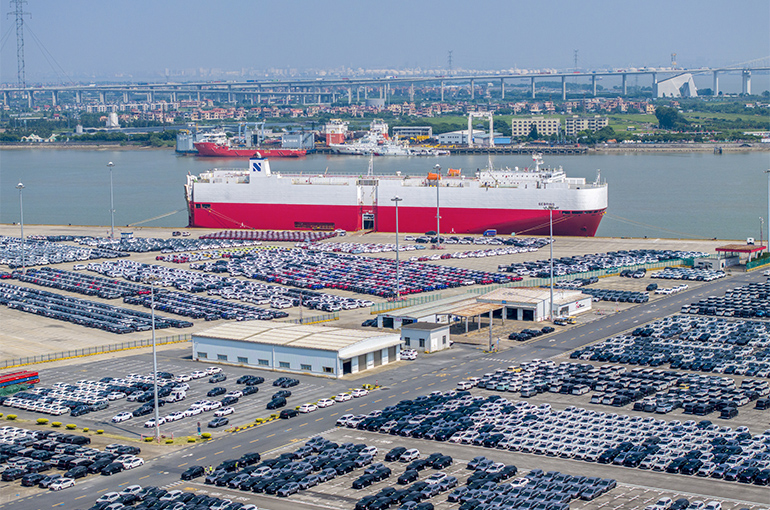 At CIIE Trade Show Saudi Arabia, UAE Make Pitches to Chinese Firms Seeking Middle East Market Entry
At CIIE Trade Show Saudi Arabia, UAE Make Pitches to Chinese Firms Seeking Middle East Market Entry(Yicai) Nov. 8 -- Saudi Arabia and the United Arab Emirates are making full use of the exposure they are getting at the China International Import Expo to not only showcase their unique products, but also to market the services they can offer Chinese firms looking to enter the Middle East market.
Representatives from First Abu Dhabi Bank, Mashreqbank, and the Ras Al Khaimah Economic Zone all have a presence at the Saudi Arabia exhibition area at the CIIE, which runs through Nov. 10.
An Arab firm participating in the CIIE for the first time plans to use the trade show in Shanghai to strengthen its connections with different provinces, cities, and big companies to explore more opportunities for collaboration in the Gulf region, its head of China investment told Yicai.
Five years ago, it was mainly central government and state-owned enterprises that bid for large infrastructure projects in the region, the person pointed out. In the past two years, more small and medium-sized tech firms and growth enterprises have been entering the Middle East market.
The six Gulf Cooperation Council countries, together with North Africa, form a vast market of more than 100 million people, the person said, adding that if Chinese businesses can get a foothold in Saudi Arabia, it can serve as a base for expanding throughout this market. Saudi Arabia is a core country in the Arab and Islamic worlds, with a shared language across the region, he noted.
The kingdom launched its Saudi Vision 2030 in 2016 to drive national transformation and is now in a similar period to China's reform and opening-up era, the person added.
The photovoltaic sector, in particular, offers significant opportunities for Chinese firms, he said. Saudi Arabia's National Renewable Energy Office, which is responsible for more than half of the new solar power capacity in the country's renewable energy roadmap, has requested bids about seven times since 2017, adding 17 gigawatts of solar capacity, with the number of projects set to grow, the person said.
And in mining, Chinese firms can leverage Saudi Arabia's favorable geographic location. The kingdom has good trade relations with Europe and the United States and is close to mineral-rich regions in North Africa. This, combined with China's industrial strengths, gives Chinese companies global coverage. In the context of today’s trade embargoes, it is not easy to find such a place, the person noted.
But there are challenges, such as the significant difference in the perception of time and contracts between Chinese and Saudi businessmen. Before coming to the region, companies should improve their understanding of the country’s customs and business practices and bring in a reliable local partner, he advised.
The Middle East's inclusive geopolitical environment, open-minded consumers, and emerging customer segments have attracted many Chinese carmakers to the region, said Ron Zheng, global senior partner and head of Asia automotive business at German consultancy Roland Berger.
Chinese car brands such as Changan Automobile, Geely Automobile Holdings, Haval and BYD are seizing market share in the Gulf region, a market that was once dominated by Japanese carmakers such as Toyota Motor and Nissan.
“The impressive performance of Chinese car brands in the Middle Eastern market is essentially a demonstration of their keen insight into overseas markets, rapid industrial ecosystem development, and ongoing business model innovation,” Zheng said.
Editor: Kim Taylor